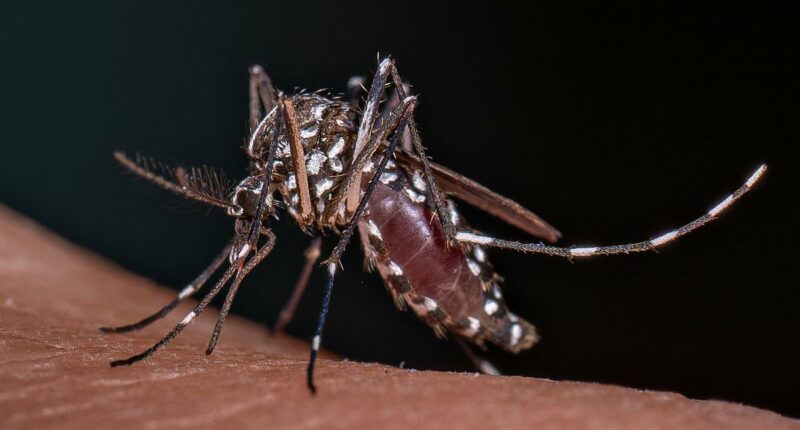Share this @internewscast.com
Scientists have issued a pressing alert as mosquitoes capable of transmitting three lethal tropical diseases have been identified in Britain for the inaugural time.
The UK Health Security Agency (UKHSA) has found eggs of the Egyptian mosquito (Aedes aegypti) as well as the tiger mosquito (Aedes albopictus).
Worryingly, these species are capable of carrying diseases including dengue fever, chikungunya and Zika viruses.
After a diligent five-year surveillance effort, UKHSA detected Egyptian mosquito eggs for the first instance at a freight storage site near Heathrow Airport in 2023.
The following year, Tiger mosquito eggs were found near a service station on the M20.
Currently, evidence indicates these were isolated occurrences, suggesting neither the tiger mosquito nor the Egyptian mosquito have established themselves in the UK.
Nonetheless, experts express concern over the UK’s potential vulnerability to these invasive species due to a warming climate and increasingly mild winters.
Dr. Cyril Caminade, a specialist in invasive mosquito spread from the University of Liverpool, remarked to the Daily Mail: ‘These species’ emergence is a signal for the future, as climate change continues to create conducive environments for both species in the UK.’

The UK Health Security Agency (UKHSA) found eggs belonging to both the Egyptian mosquito (Aedes aegypti) and the tiger mosquito (Aedes albopictus, pictured)
The Egyptian mosquito and tiger mosquito used to be limited to subtropical regions of Africa and Asia.
However, the disease-carrying pests have now spread beyond their native territory, with tiger mosquitoes establishing populations in southern and central Europe.
Between 2020 and 2025, researchers from the UKHSA installed specialised insect traps at seaports, airports, and transport hubs on highways across the country.
In the two locations where eggs were found, the UKHSA implemented enhanced local surveillance and control measures, such as working with the landowner to remove areas where mosquitoes could breed.
Following these measures, no more specimens of the invasive species were found throughout the monitoring period.
Lead author of the study, Dr Colin Johnston, says this suggests that these were ‘isolated incursions’.
Likewise, there is currently no evidence to suggest that either species is establishing a population in the UK.
Professor Heather Ferguson, an infectious disease ecologist from the University of Glasgow, told the Daily Mail: ‘The detection of Aedes albopictus [tiger mosquito] in the UK is notable and important to monitor, but it may not be of immediate public health concern.

Following a five-year monitoring campaign, UKHSA found Egyptian mosquito eggs for the first time at a freight storage facility near Heathrow Airport in 2023 (blue circle). The following year, Tiger mosquito eggs were found near a service station on the M20 (red circle)

This is the first time that the Egyptian mosquito (pictured), otherwise known as the yellow fever mosquito, has been detected in the UK
‘The mosquito species is present in several neighbouring European countries and has been rapidly expanding into many parts of the world over the last few decades. From that perspective, it is not a huge surprise that it is occasionally detected in southern England.’
These isolated detections are likely due to a few mosquitoes being carried across in cars or cargo flights from countries like Germany, France, Italy and Spain.
Given that the Egyptian mosquito is not yet established in European countries warmer than the UK, Professor Ferguson predicts that there is ‘almost zero’ chance of the species becoming established in Britain under current conditions.
Additionally, although the tiger mosquito and Egyptian mosquito pose a deadly public health concern in their native ranges, they are unlikely to prove so dangerous in the UK.
Professor Ferguson says: ‘It is not just the presence of the mosquito that is needed for these diseases to transmit – temperatures also need to be high enough to allow these viruses to survive and replicate in mosquitoes.
‘At current UK temperatures, a virus like Dengue is unlikely to be able to transmit.’
Recent laboratory evidence suggests that dengue fever needs sustained temperatures above 28-30°C (82-86°F) for several weeks to spread widely.
That means the presence of these mosquitoes is not as much of a concern as it might first appear.
However, experts are increasingly concerned that the UK’s changing climate will raise the risk of these mosquitoes spreading deadly viruses.
Dr Clare Strode, an expert on mosquito biology from Edge Hill University, told the Daily Mail: ‘Climate change could in the future lead to conditions that would allow invasive Aedes mosquitoes to survive the UK climate.
‘Increasing temperatures, including milder winters and changes in rainfall, could provide favourable conditions for them.’
Research conducted by Dr Caminade suggests that tiger mosquitoes could be active during the summer months in London and the southeast of England within 50 years.
The Thames area and Kent would be the first to be affected, but the mosquitoes could become widespread over a large part of England by the end of the 21st century if climate change is not abated.
Egyptian mosquitoes could also become active in London during the summer, but have a lower chance of being able to overwinter in the UK.
If the mosquitoes became established in large enough numbers and temperatures became warm enough for the viruses to survive and replicate, this could lead to serious public health issues.
Dr Strode adds: ‘It’s not about a pandemic risk but potential localised outbreaks in the future.’

















